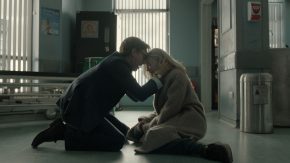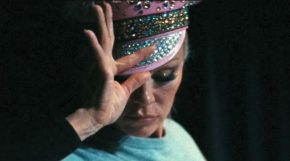It was last October when I read about the identical triplets for the first time, the ones who met as adults in 1980 and realized they were separated at birth and given to different adopted families. Many newspapers have been writing about this old story nowadays, due to the documentary Three Identical Strangers, already presented at some international film festivals. I saw it a few days ago – I guess it wasn’t such a good idea to watch it early in the night before going to sleep. Yeah, Tim Wardle (read an interview with him) is a sensitive and intelligent storyteller, and every minute of the film is worth watching – but at the same time, it comes up with dozens of dilemmas, and even one would be enough for me to lose sleep. As I said, the triplets were often in the media, but this story has one more protagonist apart from them…
In the research institute where I work, a false click or an ambiguous word is enough to reject an ethics application, which often means that research students have to reschedule all their half-year or one-year plans. We even have to fill out forms to prove that at this moment, we are only reading books. Then, as soon as our empirical research starts, we have to restart the application, adding everything related to the research participants. Who are they, how can we assure that they remain anonymous, that they are secure, that they agree to take part, that they are well-informed about the research… how to react in a dangerous situations, where to store data… I somehow had a feeling that the system doesn’t seem to trust us, although I know I’m a researcher with good intentions, and that’s what my colleagues seem to be as well.
Well, the way people seem to be…
Peter Bela Neubauer lived in Austria, just like me. Graduated at the University of Vienna, just like me. He managed to emigrate shortly before the Anschluss (to an English-speaking country, just like me), so he never experienced the holocaust himself, but he still could hear stories about/from his family members and friends. He had the vibes of a quite ambitious man. His life was science, he was determined to find out something about humanity. We don’t know what that was and who knows if we’re ever going to find out. Maybe a counter-narrative to the Nazi propaganda, claiming that genes don’t decide anything, non-white people don’t have to live their lives in ghettos, remote villages, no-go zones if they get a ‘proper’ education? Or on the contrary, he wanted to prove how strong our blood ancestors define our lives, getting our aggression, piety, or intelligence from them, no matter if they raise us or not? Maybe he tried to explain hatred against Jews with such a theory, claiming that once a Jew, always a Jew, you have to go around with centuries of persecution and surviving in your pocket, whether you want it or not? (sometimes yes, sometimes no)
And that all happened in the USA in the 1950s, in a society of dreams coming true. The land of the free, where you can be what you want to be. Social sciences were developing, without real checks and balances, as there were so many open questions to encounter! Could it be that cigarette causes cancer? Could it be that it’s not a good idea to leave a baby cry? Could it be that you might cause a fatal electric shock to your best mate? There was no ethics application because there were no research ethics in our contemporary sense. It was for a greater good, getting know the world, serving the whole society – who would have thought of those tiny little elements called human beings?
What kind of person was Dr Neubauer?, his former female assistant is asked in the Three Identical Strangers documentary. The old lady smiles as if she was back in those times again, and her answer is: ‘Sexy’. As a young lady, she didn’t understand everything of the processes his boss supposed her to help with, but she did everything he wanted. Another former assistant, nowadays an old gentleman, back then an early career researcher, still speaks about the ‘triplet experiment’ as if he had been privileged enough to know some details of a huge and mysterious secret. Indeed, Neubauer must have been a suggestive and charismatic person who could manipulate his subordinates to do anything, and they… well, they just followed the commands.
They found a partner institution, one that organized Jewish adoptive families for Jewish babies. As the war just happened a decade ago, it is likely to have had many holocaust-survivors among both the adoptive and the biological parents. One day, a lady with serious mental problems contacted the institution. Was she unable to be a caring parent at all, or not? That was actually an irrelevant question, as she herself decided to give up her maternal rights. And she gave the biggest trump ace in Neubauer’s and the institution’s hand.
Back then, they were consulting with three couples, each of them parents of an adopted girl who wanted to extend the family. One of them was a wealthy medic, always busy with work, led by the desire to fulfil all his family’s needs. The other one was a shopkeeper, not rich but full with warm kindness towards his beloved ones. And the third one, a middle-class teacher, was the true paterfamilias type whom you can’t really reach emotionally.
All families were allowed to adopt a boy, and they raised them the way they could, but they all encountered a lot of difficulties. Parents didn’t understand why this is happening to their boys. Why is he banging his head hysterically to the playpen? Why is he so restless? Why does he have bad company as a teenager, why is he constantly looking for trouble? Similar big questions in each families, with completely different parental responses. And then one day, when the boys were almost twenty already, truth came to light. At first, Robert and Eddy found each other, then David saw them in the newspaper and reached out to them. Triplets. Devastated, the parents contacted the institution, and it replied that this was a tactical decision, as nobody would have taken three babies. Of course we would have taken them all!, the shopkeeper dad reacted furiously. And the obvious question: why was it so important to keep the other two boys’ existence as a secret? The institution refused to answer.
They refused to tell the families about the documentation of each boy’s development, somewhere deep in Neubauer’s drawer. How does a mentally ill biological mother influence you? How does, for instance, a not-so-emotional and strict adoptive father influence you? How about your financial situation? What happens if you feel you don’t belong to your adoptive family? What happens if you feel something is missing, you have a hole in your soul, as if something important part had been lost? How do you suppress this for a while with smoking, drinking, partying? How does it work, then, to find your siblings due to a coincidence, and for some ecstatic years, to feel that you found the missing parts? And how does it feel to find out that lost years can’t be given back, that you are adults already who received completely different communication strategies at your respective homes? And how does it influence you when you find out in the end that someone planned and measured this all, putting you and your parents and adopted sisters and biological brothers in the balance?
How does it feel, then, that you contact the responsible organization to see the documentation about you and your brothers, but they keep letting you down? And only when the Three Identical Strangers documentary generates media interest, the organization “kindly” gives you a censored version, referring to personality rights. You read it through, try to interpret it, to search for the big secret between the lines. And you don’t find out anything, as there was no conclusion of this research, no publication reported about its results.
Neubauer died in 2008. He won’t ever tell us anymore what he wanted to find out about humanity so passionately. As for myself, I won’t ever complain anymore about the complicated ethics application system, even if it wants me to fill out a thousand pages. Because one day I’m going to die as well, and I don’t want to leave this world with the assumption that I might have contributed to other people’s misery, or even death.
In the memory of Eddy Galland



























Comments